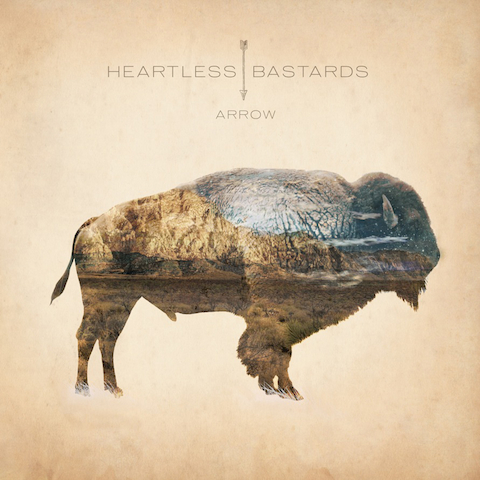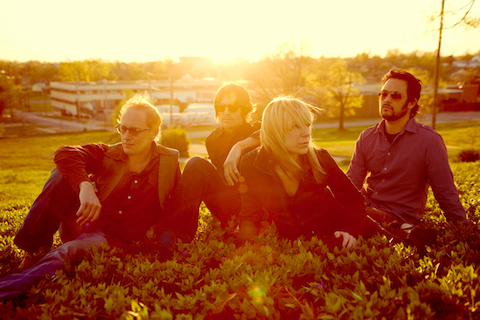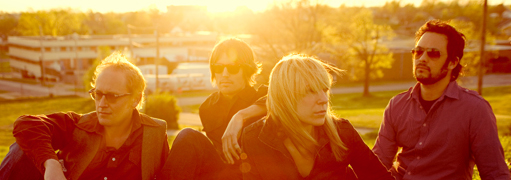That voice. You hear it and wonder who this woman is—what led her to tread down icy roads to desert heat with blues inflection and soul-cycled rhythms permeating underneath. Listening to Heartless Bastards, it’s easy to conclude that Erika Wennerstrom possesses massive vocals and songwriting abilities to match. Whether speculating on trudging through the muck of failed relationships or singing about the struggle toward a more righteous path to reflection, her songs are distinct and profound in both message and delivery.But don’t take my word for it. All you need to do is listen to one of Heartless Bastards’ songs and take notice of the rough yet crisp beats, dynamic riffs and Wennerstrom expertly guiding it all toward a place that feels somehow close to home. A mammoth, unfiltered sound marked their debut LP, Stairs and Elevators, and their latest offering, Arrow, finds them exploring new territory—with big sound, grand vocals and vibrant intensity.Heartless Bastards are kicking off another tour—they tour a lot—and stop at Launchpad (618 Central SW) on Thursday, July 18. The Alibi caught up with Austinite Wennerstrom via phone to talk songwriting, desert themes and whether she has a spirit animal. Some bands say they don’t like to listen to other music while writing and recording. What’s your process like? Do you get inspiration from other art as you write?Now that I think about it, there was a good, long time when I wasn’t listening to music that much. When I drive and get in my car, I find that I get inspired a lot to write. When I’m just driving and I don’t have any sounds, and a lot of ideas will enter my head … But I’ve been enjoying listening to music a lot, and I guess I just go through phases—like with books. Sometimes I read a lot, and sometimes I can’t focus on anything. [laughs]What have you been listening to lately?Oh, gosh, what have I listened to? Well, some newer stuff I like is Foxygen and—gosh, what have I listened to? I always liked that band Black Mountain—and I like that new Jim James album. From your first album to Arrow, your sound has grown more expansive; there’s a fuller sound now than when you started out. Do you predict you’ll go back to something akin to Stairs and Elevators?Probably not. Honestly, like Stairs and Elevators, we hadn’t done that much touring, and it was a different band. There’s really not a lot of gloss and polish on Arrow. I mean we didn’t add a whole bunch of overdubs or extra guitar parts. Most of what you hear on that album is what it sounds like when the band plays live … Even on “The Arrow Killed The Beast,” like the drum effects, the sort of bass-drummy sound, we even do that live. It’s just an effect on the soundboard. I just think that after a long period of time, it sounds like a more put-together sort of product—not a lot of filler on even the new stuff. I just think it’s recorded more clearly. I guess on Stairs and Elevators, it sounds a lot more lo-fi. But as far as production quality … there’s not a whole lot extra put on there. Your lyrics seem inspirational or at least focus on the positive. Do they start off that way, or are these mostly pep talks for yourself?I find that music is very cathartic to me. “Hold Your Head High” for instance is about something that somebody very close to me went through. And at the time, I was with them through it, and I ended up putting it in a first-person sort of perspective, but that person was so close to me that that was just my experience. But I used some quotes of things they said when they were going through it, and I don’t even know if they realize that. But as far as “I’ve made a lot of choices, most have not been wise,” I’ve taken that from myself, not from somebody else’s experience. But it was directly from my life. At the time that I wrote The Mountain, I had gone through a breakup of a nine-year relationship, and I was just not in a great spot. … It was a healing process, and certainly I find that I’m a positive person, so it’s kind of getting through that—not necessarily just singing about being down. It’s about overcoming the situation. Do you think that’s you growing as a writer as you get older?I’d like to think so. I’d like to think that my writing has grown. Sometimes I might even sing upon a similar theme, but you can’t continue. I guess I’m always gonna feel a certain way at a certain time, and you have to find new ways to express yourself … well not new ways to express myself, but new words to [use]. I also like to become a little more abstract because I think that it’s nice for people to get what they want out of a song, not necessarily what I’m saying. When it’s abstract I find that people can put their own interpretation on it. I’ve read interviews with female-fronted bands and female musicians in general, and some seem to feel they’ve had it harder because they are women. Have you ever experienced that?No, I don’t find that. I’ve never found any major roadblocks … I can only speak for myself. I mean every once in a while, I’ve talked to women in bands that might feel a little bit on the outside of things. But maybe because I front my group, I’ve been spared that—because I’m the leader of the group; whereas if I just played an instrument but didn’t front [the band], it would be a different story. I might be reading too much into this—but the Arrow album cover has a desert feel to it, and some of the songs have a Western vibe. Do you have a particular fascination with the desert? I’m also asking because I live in Albuquerque … you know, the desert.When I worked on Arrow, I was spending a lot of time outside Marfa, Texas. I had traveled there quite a bit, and we had played this annual festival called El Cosmico. And I have a friend whose family has a ranch out there, and there’s a house on it that sits empty a lot—that she loans to friends. And she stays there when she has time off. And I was fortunate enough to be able to stay there and work on the album. And it’s out in the West Texas desert, so a lot of the imagery on the album and a lot of the experiences writing it were out in the desert. This is a quirky question, but what do you think your spirit animal is?Oh wow, I haven’t really thought about it. Is there a category of spirit animals—sort of like signs?No, not really. [laughs]Is it just something from a hippopotamus to a scorpion—?I don’t think so. A friend assigned me one, though. It’s a capybara. I don’t know if I necessarily agree.[laughs] Yeah—I probably would decline to answer that—just because I’d have to come up with something on the spot, and I don’t know—I consider myself sort of spiritual in a lot of ways, but I don’t know. Every once in a while I read my horoscope. I saw y’all play in Austin at the Continental Club, and you guys were sort of road-testing the Arrow material before going into the studio to record. Do you think that assists in the process? Yeah, I think that it helps a lot because when your’e first working things out, it takes a while to notice when something isn’t working. So touring for months helped us figure that stuff out before we went into the studio, so that was good. Are you playing any new material, or mostly still touring Arrow?I’m not sure yet. I’ve got some new ideas I’ve been working on, but our drummer Dave [Colvin] moved to Pittsburgh, and I thought we might start working on ideas on soundcheck throughout the tour. But as far as Albuquerque—I don’t know if we’ll have time to work on something enough to present it. But hopefully by that time, we’ll have some stuff on the live set. What songs are you most proud of writing?There are definitely songs I feel extra proud of or never get tired of singing and playing. I do always love playing “Hold Your Head High”—I always love singing “The Arrow Killed The Beast.” It’s probably not one of the more popular songs. It’s kind of slower, but I love singing it.What do you think of the state of music today?The way I look at it is there’s been decades and decades, and there’s always been good and bad music. That’s always been so interpretational or so relative to a person’s opinion. But I find that today there’s still very much good music being written, and it’s just a matter of finding it. I’ve at times said, “Oh I don’t think music is as good as it used to be,” but I don’t think that’s true. I’ve toured with a lot of great bands that are doing great things, and I just think it’s easier [to think] the grass is greener on the other side. It’s so much easier for people to look back and say, “Oh that was such a bygone golden era.”
Heartless Bastardswith WriterThursday, July 18, 9:30 p.m.Launchpad618 Central SWTickets: $15











